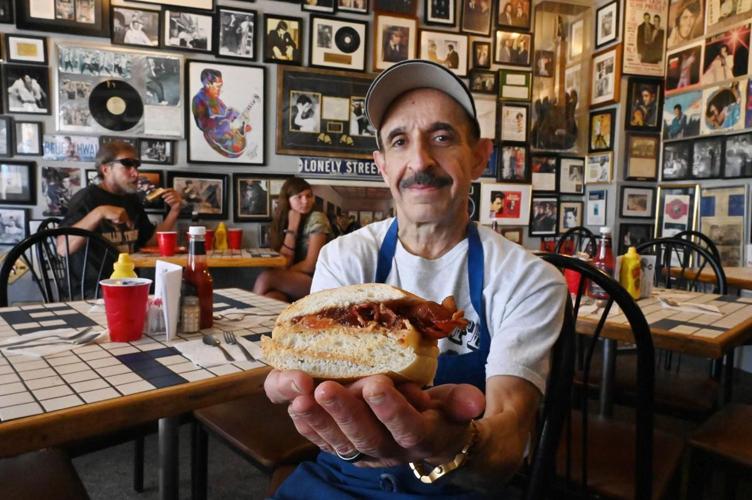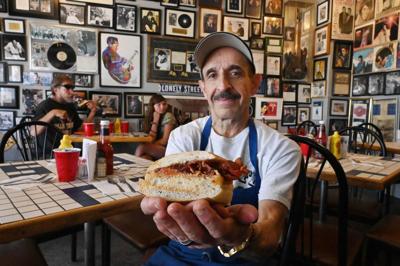GOLDEN • In the rush of traffic here at a busy intersection of U.S. 6, amid the big, corporate buildings, it’s easy to miss the little cafe tucked between a liquor store and gas station.
This is Nick’s Cafe, drab on the outside, unremarkable.
But signs let you know the stories inside are anything but.
“PARKING FOR ELVIS,” reads one. “VIOLATORS WILL BE SHOOK UP.
And one above the door: “HOME OF THE FOOL’S GOLD SANDWICH.”
It is a legendary sandwich, known by Elvis Presley fans worldwide. They know the poor, country boy who would be King grew up loving peanut butter and jelly sandwiches, the one his mother made with bananas.
But in Denver, the story goes, Elvis found a PB&J to rule them all.
It was served by a teenager named Nick Andurlakis, who would later describe the sandwich as a “ginormous, artery-hardening contraption.”
Andurlakis cooked at the Colorado Mine Co., frequented by celebrities throughout the 1970s. And on the menu along with prime rib, filet mignon, lamb and lobster tail, there was the Fool’s Gold — a hefty, sourdough loaf loaded with peanut butter, blueberry jam and bacon.
That’s what Elvis wanted. That’s what Elvis came back for, traveling to Denver exclusively for it, newspapers reported. J.D. Sumner, Elvis’ confidant, estimated it ran the private jet $16,000 to fly from Graceland and back for one famous night of Fool’s Gold feasting in 1976.
Young Andurlakis was there that night, delivering the sandwiches to the plane parked at the former Stapleton International Airport.
And now, four decades later, Andurlakis continues serving them at Nick’s Cafe.
There’s only room here for nine small tables. A holy ghost sings from a concert video. And all around, occupying every inch of the walls, are pictures of rock ‘n’ roll’s greatest saint in the flesh.
“Black-and-whites are my favorites,” says Andurlakis, 63.
He motions to one — the impeccably good looks shining through a big, messy bite. “That’s him eating the Fool’s Gold sandwich,” Andurlakis says. “And that’s me looking.”
He’s kept the mustache but not the weight of that kid over Elvis’ shoulder. “I was a big fat boy then,” Andurlakis says. “A long time ago.”
A long time ago feels very near in Nick’s Cafe.
Old newspaper and magazine clips also consume the walls, along with framed records and an encased guitar, complete with a familiar signature. The King was famous for gifts, and this was one for Andurlakis, given during one of several late nights the two met at the Colorado Mine Co.
Elvis would come through the back door with an entourage that included Denver police officers he befriended. One of these was Bobby Pietrafeso, who today just so happens to work across the street from Nick’s Cafe at the RV dealership.
He still keeps his TCB (Taking Care of Business) necklace — the diamond-studded lightning emblem Elvis gave few others, officially introducing them to his inner circle. And Pietrafeso still looks after “Nicky,” as officers did back then.
“He lives and breathes Elvis,” Pietrafeso says. “I don’t think they get anymore Elvis than Nick Andurlakis.”
Also in the cafe are collectibles, lunchboxes and toys, an Elvis Santa at the piano. Now and then, the owner swears it plays without any batteries.
Now and then, faced with their Fool’s Gold and surrounded by the music and memorabilia, patrons will be overcome by emotion.
“They’ll just sit and cry,” says Andurlakis’ wife, Kathleen. “I really do think Elvis Presley’s presence is here.”
Hunger for normalcy
With a little help from Pietrafeso, Andurlakis opened the cafe in 1986, four years after he was sad to see the Colorado Mine Co. close.
There as a teenager he had made enough money to take care of his family. The elder Andurlakis was a cop who took a bullet in the line of duty, confining him to a wheelchair for much of his life. He died before he could see his boy become a man.
But Nick had other cops for role models. “They always wanted to include me,” he says.
One late night, one called ahead to the Mine Co., telling the young cook a special guest was on the way. Nick initially couldn’t spot him in the group of uniformed men.
Then “I see this man and it looks like Elvis Presley,” he recalled to the magazine Westword. “And it was Elvis. He was wearing a captain’s uniform.”
Elvis had been in Denver for a funeral; a brother of one of his police friends had died. The day is recalled in a book by Robert Cantwell, then a narcotics detective, who wrote of the unlikely companionship blossoming from a 1970 concert security job.
In “The Elvis Presley I Knew,” Cantwell describes how he and the singer bonded over their tough upbringings. Full of photos and records, the book might be the most detailed account of Elvis’ time in Colorado.
“The poor guy,” Pietrafeso says. “If he wanted to go anywhere, he had to go at night and stay in the shadows, just to have his own life. We treated him just like one of the guys. And that’s all he wanted. Just to be one of the guys.”
Pietrafeso remembers last-minute calls from Elvis, saying he was flying to Denver for lunch. Pietrafeso remembers football Sundays with the King, making sausage sandwiches.
Elvis hosted the Denver crew in Graceland, invited them to shows around the country and celebrated a birthday with them in Vail, where he again wore his honorary police badge. He was known to collect these, “like a little kid wannabe cop,” Cantwell wrote. Often out with the guys, Elvis wore the whole uniform to blend in.
These are stories Nick and Kathleen love.
“He was hungry for being just a normal person,” she says. “That’s why he liked to be in Denver so much.”

Nick’s Cafe has walls covered with Elvis memorabilia, including a photo of Elvis eating a Fool’s Gold sandwich. JERILEE BENNETT, THE GAZETTE
And after one visit to the Colorado Mine Co., he was hungry for more Fool’s Gold, that massive take on his childhood favorite.
The craving came after midnight, Cantwell recalled, “out of the blue.” Elvis would be flying in. Thankfully, Nick was around to prepare the sandwiches. And “thank God there was plenty of mineral water on the plane,” Cantwell wrote, “to wash down the mounds of peanut butter.”
Andurlakis remembers Elvis needlessly apologizing; he hadn’t talked with him at the restaurant earlier. Now there was a long talk with the starstruck kid.
But “it felt like 10 minutes,” Andurlakis says. “Like, boom, done.”
The details escape him now. “My memory’s not that good anymore to be honest. I’m sorry.”
But he keeps a grainy photo from that Fool’s Gold feast on the plane. In it, Elvis is bestowing a chain from his neck onto the youngster’s.
“I actually had it shortened,” says Andurlakis, wearing the gold cross now. “It was down to my belly button.”
A star fades
Where his memory fails, Andurlakis has Cantwell’s book to relive that time.
“That was old Denver,” Andurlakis says. “That was old times. Everybody knew everybody. You could walk the street and people’s doors were open.”
Elvis is wrapped up in that nostalgia — the megastar who surrounded himself with blue-collar people.
Why, there Pietrafeso was one night in the halls of Denver’s old McNichols Arena, a middle-class kid now alone with the glitzed-out King, just for a moment.
“He was looking down at the ground, fists clenched,” Pietrafeso says. “He looks up at me: ‘Are you nervous?’ I said, ‘No, are you?’
“He said, ‘Damn right I am.’”
The guys worried about him. In “The Elvis Presley I Knew,” Cantwell recounts hard conversations with Elvis: about his ego; about “acting out the persona that he felt was expected of him”; about the gifts becoming too much.
Elvis had bought Cantwell a Cadillac. Reporters were starting to ask questions of impropriety.
Cantwell wrote of himself trying to explain, but Elvis was “fuming,” feeling insulted. Elvis “said he had never been questioned before when he gave gifts,” Cantwell wrote, “because he had a line of people wanting something from him.”
The friendship recovered, Cantwell wrote. But it wasn’t meant to last.
Critics took note of the sudden weight gain, the slurred lyrics, the suddenly frozen hips, the star fading.
The cadre from Denver attended the 1977 funeral in Graceland.
“A Lonely Life Ends on Elvis Presley Boulevard,” read the headline out of Memphis, capturing the painful revelations of America’s favorite son.

Nick Andurlakis wears a cross around his neck that was a present from Elvis. “Truly amazing,” Andurlakis says of Elvis. “Generous, frustrated, overly trusting in people. I think that’s where he got wound up. He put too much trust in people.”JERILEE BENNETT THE GAZETTE
Heart failure was the official cause of death, but drug abuse would be implicated. Charges came for Elvis’ prescribing doctor.
And more questions came for his Denver pals. How did they not see the addiction?
He took what his doctors prescribed him, Pietrafeso maintains: “downers to go to sleep, uppers so he could do his shows and keep going.”
In his book, Cantwell retold one angry reply to a reporter:
“If anything, Elvis overdosed on greasy food, hamburgers and Fool’s Gold sandwiches.”
Long live the King
At Nick’s Cafe, there is no speaking of Elvis’ dark side.
“What really hurts me is when people come in and say, ‘Oh, it was just terrible how he died.’ That’s not how you need to remember him,” Kathleen says. “I mean, he was a truly amazing man.”
Nick nods. “Truly amazing. Generous, frustrated, overly trusting in people. I think that’s where he got wound up. He put too much trust in people.”
He trusted Nick with a guitar and necklace, and Nick intends to keep them, declining offers from buyers. They are his treasures, along with his watch collection. He might own 150, he says, including a pocket watch his dad left him — another reminder of how time slips away.
At one point while reminiscing, Nick stops. He looks down, and retreats to the kitchen to hide his tears.
When he met Elvis, he couldn’t have known he’d die within two years at age 42.
“And Nick was 16 or so, and he had just lost his dad,” Kathleen says. “Maybe there was that kind of connection of some sort. You know?”
The cafe falls silent. The little TV screen in the corner fades to black. The Elvis concert video has ended.
Nick notices this. He grabs the remote, fussing with it for a second. “Sweetie?” he asks, and Kathleen comes over, knowing which button to press.
The roar of the crowd returns. The voice comes through, strong as ever. And here in Nick’s Cafe, Elvis plays on.











(0) comments
Welcome to the discussion.
Log In
Keep it Clean. Please avoid obscene, vulgar, lewd, racist or sexually-oriented language.
PLEASE TURN OFF YOUR CAPS LOCK.
Don't Threaten. Threats of harming another person will not be tolerated.
Be Truthful. Don't knowingly lie about anyone or anything.
Be Nice. No racism, sexism or any sort of -ism that is degrading to another person.
Be Proactive. Use the 'Report' link on each comment to let us know of abusive posts.
Share with Us. We'd love to hear eyewitness accounts, the history behind an article.